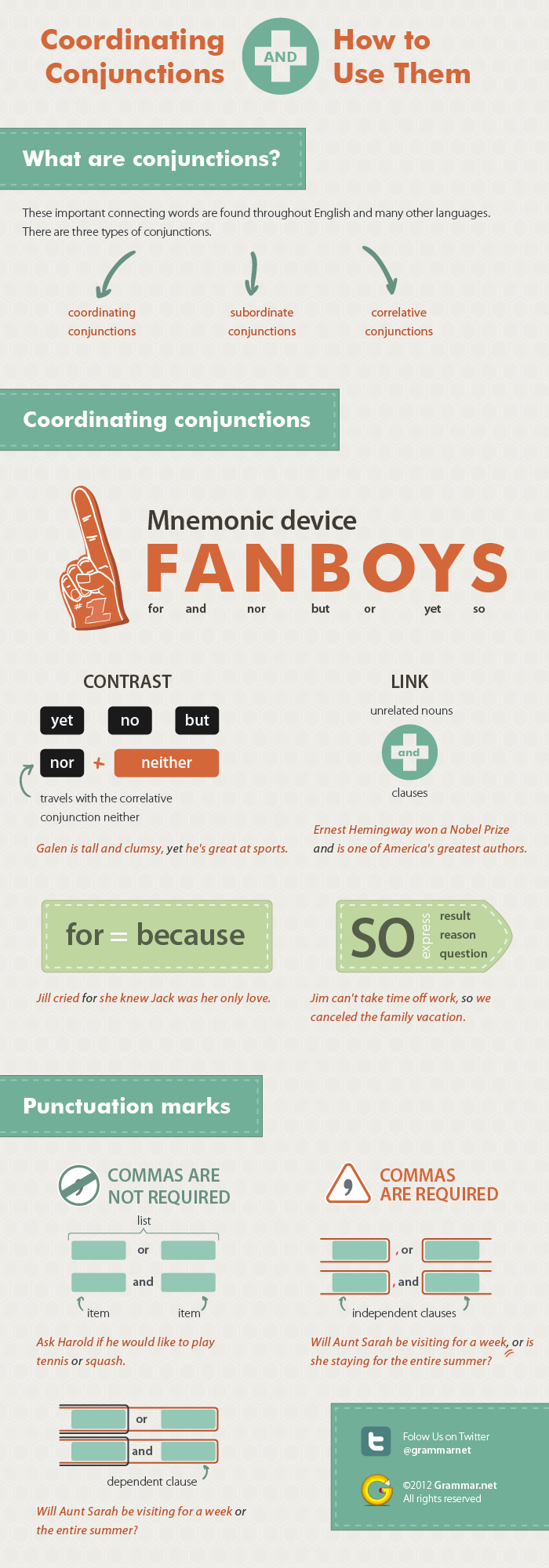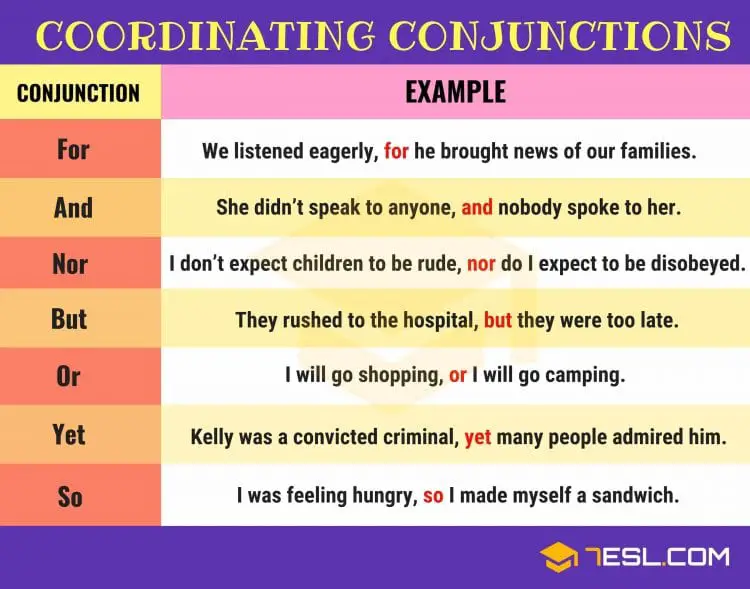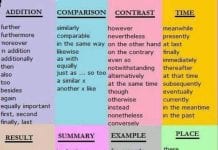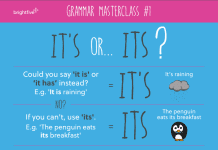What Does Conjunction Mean?
A conjunction is a word that grammatically connects two words, phrases, or independent clauses together. The most common examples are words like “and” and “but.”
For example,
- “I took the subway, and got off at 96th Street.”
Or,
- “I took the subway, but there was a delay.”
However, conjunctions can come in many forms with many different functions.
They’re a part of speech that can be broken down into several categories, and we’ll explore each one in-depth with examples.
Conjunctions can primarily be broken down into three categories:
- Coordinating conjunctions
- Correlative conjunctions
- Subordinating conjunctions
What is Coordinating Conjunction?
Coordinating conjunctions always come between two clauses in order to connect them. These are two ideas that are related and can, therefore, be placed into one complete sentence.
A coordinating conjunction is conjunction like “and” and “but.” It joins together words, phrases, or clauses that are grammatically equal. The seven coordinating conjunctions are:
What Does FANBOYS stand for?
- For
- And
- Nor
- But
- Or
- Yet
- So
You can remember these conjunctions using the acronym FANBOYS. These are all very useful constructions to improve the flow and fluency of language.
The seven coordinating conjunctions can be remembered using the acronym: FANBOYS

FANBOYS Examples
👉 For
shows reason or purpose (sometimes because can be used instead)
- I go to the library, for I love to read.
While the word “so” introduces the “effect” part of a cause-and-effect relationship, the word “for” introduces the cause.
- My husband and I went to Costa Rica, for it was our five-year anniversary.
- The neighborhood had a memorial last weekend, for a family’s son had passed away.
Using the word “for” like this, however, can sound a bit formal and unnatural in spoken English. Instead, it’s better to use subordinating conjunctions like “because” or “since,” which we’ll discuss later. Meanwhile, the word “for” can take different usages as a preposition, not a conjunction. For example:
- What are you doing for New Year’s?
- Is this gift for me or someone else?
- I’ve been living in Los Angeles for about six months.
Although you may have been taught otherwise, it’s often acceptable for a sentence to begin with a coordinating conjunction, as long as it forms a continuity with the sentences preceding it.
When used in writing, in fact, it can often feel more natural to begin a sentence with “and” or “but” instead of forcing separate sentences together with a comma. For example:
- Sometimes, Jack can come off as a bit insensitive, but I know he means well.
- Sometimes, Jack can come off as a bit insensitive. But I know he means well. (Also a valid use of the word “but”)
- The sushi restaurant down the street is the best I’ve ever been to. And it was a good deal.
👉 And
connects two or more ideas
- I like to eat cookies, and I like to drink milk.
The conjunction “and” is used to join two or more items that make sense with each other.
- I put mayonnaise and mustard in this sandwich.
- My friend likes to go mountain-climbing and swim in the ocean.
- My mom was born in the U.S., and my dad was born in Switzerland.
It can also be used to connect a series of events.
- Everyday after school, I go to the library and study.
- The president arrived and gave an hour-long speech.
If you want to list several items, use commas and the word “and” at the very end (the Oxford comma is optional).
- I wasted so much time, energy, and money on that trip.
- The dog barked, growled and scratched until his owner let him back in the house.
👉 Nor
shows a non-contrasting, negative idea. Adds more negativity.
- I refuse to hug to people I don’t know, nor will I kiss them.
While “and” is used to join two positive items together, the conjunction “nor” is used to pair two negative items. It’s found either with the word “not” or with the word “neither.”
- He didn’t return my calls, nor did he respond to any of my texts.
- Neither the yoga nor the running made my back feel any better.
- I didn’t think that it would snow so early in the year, nor did the weather forecast.
Note the word inversion that often accompanies this conjunction.
👉 But
shows contrast or exception.
- Sheila likes soup, but sometimes she orders something different.
The conjunction “but” is used to join two items that contradict each other or create a certain tension with each other.
- The dress was beautiful but slightly expensive.
- I put a lot of effort into the assignment, but I couldn’t even get an A.
- My mom doesn’t like to cook, but she does it anyway.
A common usage of the word “but” is in the construction “not…but.” You can also use the word “rather” to emphasize the contrast in the statement.
- It wasn’t a bird but a squirrel that’s been ravaging the garden.
- Strawberries aren’t actually berries but rather an “accessory fruit.”
👉 Or
shows choice or option.
- He could go to the bar, or he could go to work.
The conjunction “or” can be used to present two or more options. It’s often paired with the word “either.”
- Do you like chocolate or vanilla better?
- He’s either flirting with me or just acts unusually nice to me.
- You can come buy groceries with me, or you can stay home until I get back.
👉 Yet
also shows contrast or exception.
- He had been crying all day, yet the man made him laugh.
The conjunction “yet” is very similar to “but.” It means something like “nevertheless” or “but at the same time.”
- He can be strict yet understanding at the same time.
- The sauce was sweet yet had a spicy flavor to it.
- I got a new prescription for my glasses, yet my vision is still a bit blurry.
Don’t get this conjunction mixed up with the other usage of the word “yet.” For example:
- Did she call you back yet?
- Is your roommate awake yet?
👉 So
shows consequence.
- The lady was feeling ill, so she went home to bed.
If you want to express a cause-and-effect relationship, you can use the conjunction “so.” It introduces a clause that is the effect of a previous clause.
- It was the week before Christmas, so the mall was unusually hectic.
- The traffic is a bit heavy on the main road, so try taking a residential detour instead.
- The mistake was already made, so there’s not much you can do about it now.
Notice that the word “so” can be used to justify a suggestion or command. It can also be used to explain the basis of a question. For example:
- My dog gets a bit rowdy sometimes, so put him in his cage when you need to.
- All the bars are closed by now, so what do you want to do instead?
Another usage of the conjunction “so” is to introduce a new idea or change the subject, whether this has a cause-and-effect relationship or not. For example:
- So, what do you want to talk about now?
- So, how has your day been?
Be careful not to mix up the coordinating conjunction “so” with other usages of the word “so.” For example:
- The line was so long we bailed within the first five minutes.
- “Is it going to be warmer tomorrow?” “I think so.”
- I hid the presents so that the rest of my family wouldn’t find them.
More for you:
Examples of Conjunction Words in a Sentence!
What conjunction can we use to combine the following sentences …
Difference Between: Whatever – So – But – For
Fanboys Definition / Fanboys Conjunction / What are Fanboys?
Fanboys is and acronym for coordinating conjunctions in the English language. There are 7 coordinating conjunctions in the English language. These are:
- For / And / Nor / But / Or / Yet / So
Fanboys is the word the first letters form. This is the acronym for all coordinating conjunctions in the English language and it is used to easily remember them.
Since fanboys are coordinating conjunctions that means they are used to coordinate two or more parts of a sentence. There are different ways to coordinate parts of a sentence. You can connect them, oppose them, correlate them, establish causality, exclusion, etc.
Fanboys are used to connect and coordinate parts of a sentence depending on what you want to say. Each of the 7 coordinating conjunctions serves a different purpose. When you want to form complex sentences and connect two or more parts, you have to use Fanboys.
Fanboys Sentences / Compound Sentences using Fanboys
Sentences that have more than one part have to be connected with conjunctions. One of the most commonly used conjunctions are Fanboys. These coordinating conjunctions are very important to build complex sentences, and do so correctly.
Examples:
- They were still playing on the dirty field behind the house, for they didn’t know better.
- There was so much food at the party, and Diana even made it all herself.
- He doesn’t drink, nor does he smoke.
- My favorite team did lose the game, but you could see they gave it their all.
- This restaurant serves amazing steak, or if you want they also have fish.
- He has problems at home, yet he doesn’t let that distract him from his job.
- His father made sure he studies in high school, so he was later able to attend a good college.
When you want to coordinate two parts of a sentence in order to make a point, you use Fanboys. Through Fanboys you can bring your point across, and form complex sentences. Sentences with only 1 part are often far too simple to say what you mean exactly.
Are Fanboys Preposition?
Fanboys are not prepositions. Fanboys are used to bring together two parts of a sentence, and prepositions are used link nouns, pronouns, or phrases. Prepositions don’t link sentence parts, but Fanboys do.
Fanboys Punctuation / Fanboys Comma Rule / Fanboys without a Comma
Two parts of a sentence when connected with Fanboys are always divided by a comma. The comma is used to divide two parts because each is a separate entity, and has a different idea. Fanboys are used to connect these two parts, and the ideas, but the comma shows where one part stops and the other begins.
So, a comma always divides the two parts of a sentence and the Fanboys.
- , for / , and / , nor / , but / , or / , yet / , so
How to use Fanboys in English?
When you want to combine two parts into one longer sentence you need to use Fanboys. They are essential when forming complex longer sentences. Fanboys are so often used in English that many people use them by instinct.
How you use Fanboys is simple. When you’ve finished one sentence, one part, and you want to continue with another part to form a longer sentences you combine the two with Fanboys. “And” is one of the most commonly used words in the English language. It’s also one of the Fanboys.
When to use Fanboys in a Sentence?
You should use Fanboys when you want to combine two larger parts into one sentence. If the two main ideas of each part can be coordinated into one larger sentence you can do that with Fanboys. Fanboys are called coordinating conjunctions not only because they connect two parts, but also because they coordinate the two main ideas.
Fanboys are one of the most common, and widely applicable, ways of coordinating sentences.
Are Fanboys subordinating conjunctions?
Fanboys are not subordinating conjunctions. Fanboys are coordinating conjunctions.
Are Fanboys the only coordinating conjunctions?
Fanboys are the only coordinating conjunctions. Fanboys is an acronym of all coordinating conjunctions. The word is pretty handy to remember them all easily.
Are Fanboys transition words?
Transition words is the name of a large group of words. This includes all words that are used in order to transition from one part of the sentence to the other. Fanboys are a part of transitional words.
Compound sentences without Fanboys
Compound sentences can be created without Fanboys. Since Fanboys are only one type of conjunction, you can also use the other types. Compound sentences can be created with correlative conjunctions, or subordinating conjunctions.
Correlative conjunction example:
- Julian said he would fix the roof by Monday, whether he does that is a different story.
Subordinating conjunction examples:
- I might get an A in this class, only if I a get at least a B- on this last test.
- We can finally move on to the production phase, now that we’ve all signed the forms.
- There’s always aspirin in the medicine cabinet, in case anyone needs it.
There are various conjunctions in the English language which are used to create compound sentences. Fanboys are one of the most common ones, but others are also used fairly frequently.
Fanboys acronym
Fanboys is the acronym used to remember all coordinating conjunctions. It’s made up of the first letter of these words: for, and, nor, but, or, yet, so
Fanboys is an acronym for which part of speech?
Fanboys is an acronym for coordinating conjunctions. Conjunctions are words are used to link other words, phrases, and sentences.
Fanboys with Semicolons
Fanboys are not divided with semicolons. This is because a semicolon is used to divide two sentences that are somewhat connected, but still have to be divided with something stronger than a comma. A semicolon is something between a full stop and a comma.
Since Fanboys coordinate two parts of a larger sentence, you should only ever use a comma.
Conjunction examples / Conjunction word list
There are three types of conjunctions in the English language: coordinating (Fanboys), correlative, and subordinating conjunctions. Each of these types fulfills a different role when combining parts of a sentence.
Correlative conjunctions:
- both/and, either/or, neither/nor, not only/but, whether/or
Subordinating conjunctions:
- after, although, as, as if, as long as, as much as, as soon as, as though, because, before, by the time, even if, even though, if, in order that, in case, in the event that, lest, now that, once, only, only if, provided that, since, so, supposing, that, than, though, till, unless, until, when, whenever, where, whereas, wherever, whether or not, while
Conjunction Sentences
- He was cheating on his last test, both of us knew it but we didn’t do anything.
- Take the next exit on the A1 freeway to get to the city, supposing the map is correct.
- Our company provides aid for all elderly people, not only those with disabilities.
- We have a first aid kit in the house, in the event that there’s an emergency.
- Diana will not be able to receive those benefits, unless she registers as unemployed.
- Marcus and Tom are so happy now, since their neighbor moved away.
- Max should be able to visit his parents more, now that he has his driver’s license back.
- No Emma you can’t have cookies, because you’ve been really bad today.
- First we’re going to have a nice dinner, after which we’re going to a fancy bar downtown.
- I loved living abroad, while at home not so much.
Is but a conjunction?
Yes, but is a conjunction. It is also one of the Fanboys.
However Conjunction
However can be used as conjunction, or as an adverb. It does not fall under any of those categories strictly, so it’s very versatile.
However is used as an adverb to show how a sentence relates to a previous one. It joins the things that are being said through context.
When however is used a conjunction it connect two sentence parts.
Conjunction examples:
- You can take the car for tonight, however if you damage it you’ll never get it again.
- However you look at it, we’re not going to get a better deal.
Adverb examples:
- The prices are going to rise this year even more. However, I don’t think the top 1% will be affected.
- However hard you try to beat him it’s no use.
Conjunction Phrases
Conjunctions are not phrases. They are used to connect phrases and various parts of larger sentences. Even if a conjunction has more than one word it is still not a complete phrase.
Is Because a Coordinating Conjunction?
Because is not a coordinating conjunction. It is a subordinating conjunction.
Fanboys Exercises
The best exercises to practice using Fanboys are ones where you have to fill in the blank space. Fanboys are not interchangeable, and they depend on the context of the sentence. That means in sentences there is commonly only one correct answer when asking to fill in the correct Fanboys.
Sometimes there can be two options, which depends on the context. If any of the two correct options are used in the exercise, then a point should be awarded.
Example:
- They wanted to go out this Saturday, ___________ (but) they changed their minds.
- She prepared for the party for ages, _________ (yet) there still wasn’t enough ice.
- There weren’t any mushrooms in the store, _________ (so) Megan bought aubergines.
- When you get you should know you can’t eat inside, ___________ (nor) can you litter.
- She loves lollipops because they are hard on the outside, ___________ (and) there’s gum on the inside.
- You can always choose to not take the test, __________ (or) you can ask the professor to give you an essay task.
- Tell Damien he has to try the pork roast at the restaurant, ___________ (for) there is nothing better than a good pork roast on a Sunday.
Exercises for the use of Fanboys are essential in order to learn them. It takes practice to recognize the right context, and use the right Fanboys. Filling in the blank space with a Fanboys is a great exercise to practice their use.
How to Teach Fanboys?
The best way to teach Fanboys is through practice. You should make sure the students know how to structure sentences with only one part. Once they know how to do that you can move on to coordinating two parts using Fanboys.
The use of Fanboys depends on the context of the two parts. So, it’s very important that the students understand context before practicing the use of Fanboys. Since context dictates which Fanboys is going to be used, it’s most important to understand that part of the sentence construction.
One of the best ways to teach Fanboys is through fill in the blank exercises. When the students have learned context and proper sentence construction, they can start to practice coordinating two parts of a longer sentence.
Learn English Language
- What is Clause? Clause Definition
- What is a non-defining relative clause?
- Restrictive And Nonrestrictive Clauses
- ADJECTIVES CLAUSES with Object and Subject Relative Pronouns!
- Its vs. It’s
- Dependant vs Dependent in English!
- What are Famous Proverbs?! 65 Famous Proverbs
- 36 Examples of Verb + Noun Collocations [List]
- List Of Phrasal Verbs with GET!
- Put the Verbs in Brackets into their Correct Form…
- Technical Writing for Engineers › Technical Writing Samples & Important Words
- Common WRITING PHRASES for Business Emails, IELTS, Essays, Reports
- 24 Subordinating Conjunctions: BECAUSE, SINCE, LIKE, WHEN, IF, AS, …
- 👉 100+ Prepositional Phrase Sentences List ✅ & Prepositions
- I hate to waste a single drop of this perfume. The perfume is expensive and rare to make. (Coordinating Conjunctions)
- How to Remember Rules of Grammar, Idioms and Vocabulary
Browse by Category
A Adjectives B Business English C D dictionary E English grammar English Idioms English language English Learning Tips English phrases English teacher English Vocabulary English Vocabulary English words F G H how to learn english I idioms Infographic J L Learn English M N noun O P phrasal verb R S Skype T teach English Teaching English as a foreign language Text Abbreviations The Jungle Book tips U W Y
- Abbreviations
- acronyms
- Advanced English Lesson
- Adverbs
- Apps
- Arabic
- Articles
- Beginner English
- Books
- Business English
- Clauses
- Collocations
- Conjunctions
- Difference Between
- English Grammar
- English Idioms
- English Learning Tips
- English Questions and Answers
- English Speaking
- English Test
- English Videos
- English Vocabulary
- English Vocabulary Dictionary
- English Writing
- For Kids
- For Teachers
- French
- Games
- German
- Hindi
- Hungarian
- IELTS
- Infographics
- Intermediate English
- Italian
- Japanese
- Learn English
- Listening Skills
- Lyrics
- Names
- Phrasal Verbs
- Portuguese
- Prefix
- Prepositions
- Proverbs
- Q&A
- Quiz
- Quotes
- Russian
- Should
- Spanish
- Suffix
- Synonyms
- Teach English
- Technology
- Uncategorized
- Understanding
- Useful English learning websites
- Vietnamese
Latest Posts
- Supposition Meaning
- Summary of how Components of Health are related to Wellness
- Understanding the Extroverted Introvert
- Very vs Vary: Understanding the Difference
- Inspiring Introvert Quotes for Quiet Reflection
Latest Comments

Hello. Thank you very much for the most detailed and clear explanation! Could you please comment on this sentence where…

“Hey there! Just wanted to send you a bunch of good luck vibes as you go for captain of the…

i need a good luck message for a teen trying out for captain of the drill team with the word…

Very useful for learning english language. Thank you!

thanks for post








![Request for Quotation [Template] 📮 How to Write an Email Asking for a Quote?](https://www.myenglishteacher.eu/blog/wp-content/uploads/2018/11/maxresdefault-218x150.jpg)

















Such a useful site
This is so cool.
ahhhhhhhhhhhhhhhhhhhhhhhhhhhhhhhhhhhhhhhhhhhhhhhhhhh
dababy convertible
this cool
I don’t know where should I start learning grammatical points?
I would start at the simple present and so on. Learn Tenses.
Could you please guide me?